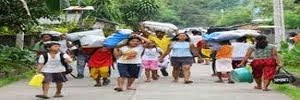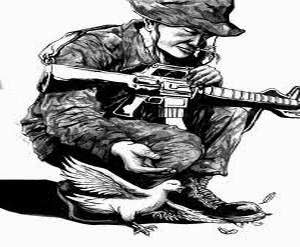From the Website of DSWD
We’ll stand together to fight poverty – DSWD officials
Posted on 30 January 2014.
(Left
photo) DSWD Undersecretary Parisya Taradji talks about the importance
of convergence in addressing poverty issues. (Right photo) DSWD
Assistant Secretary Camilo Gudmalin shares his own experiences in
working in the Aceh 2004 tsunami operations and compares it with the
Typhoon Yolanda disaster response.
Department of Social Welfare
and Development (DSWD) Undersecretary Parisya Taradji and Assistant
Secretary Camilo Gudmalin called for greater convergence of government
efforts in addressing the poverty situation in the Philippines,
particularly in light of the expectation that stronger disasters will
hit the country in the future.
“Our biggest enemy is poverty,”
Asec. Gudmalin said. He explained that calamities will only worsen the
situation, making poor people poorer and even push those that were
previously identified as non-poor into poverty.
Previously, DSWD
Secretary Corazon Juliano-Soliman said that the “new normal” is the
Philippines falling prey to strong calamities at the level of Typhoon
Yolanda, which devastated Visayas and Palawan last November.
Asec. Gudmalin explained that unified efforts need to be made in order to combat poverty.
He
said, “Walang isang programa na kayang lutasin ang kahirapan (There is
not one program that will be able to solve poverty singlehandedly).”
He
went on to describe the three main programs of the DSWD – Kapit-Bisig
Laban sa Kahirapan-Comprehensive and Integrated Delivery of social
Services (Kalahi-CIDSS), Pantawid Pamilyang Pilipino Program, and the
Sustainable Livelihood Program (SLP).
Taken together, the three
was dubbed by the DSWD as Tatsulo, short for “Tatlong Sulo” (Three
Torches), with the programs each a lit torch to combat the darkness that
is poverty.
Asec. Gudmalin stressed that the unique
contributions of each program should be brought to play to respond to
the needs of the poor. As an example, he shared how some Pantawid
Pamilya families are unable to improve their status because of the lack
of availability of facilities providing basic services such as health
care and education.
This problem, Asec. Gudmalin explained, can
be solved through the Kalahi-CIDSS, which can help provide the
supply-side requirement of the Pantawid Pamilya through its community
interventions. This may include the construction of small-scale
infrastructures designed to address the most basic needs of communities
in the poorest municipalities in the country.
These small-scale infrastructures include school buildings, day care centers, health stations, and access roads, among others.
Meanwhile,
Usec. Taradji said that they can also generate income through the SLP,
which provides employment and business opportunities.
The Department now aims for greater convergence of its programs.
According
to Usec. Taradji, the focus is now not just on the agency’s three main
programs, but its other services as well, which include the Social
Pension Program and the Supplementary Feeding Program.
Both
Usec. Taradji and Asec. Gudmalin also made mention of the anti-poverty
programs of the national government, which is being implemented by
government agencies.
One such initiative is the Grassroots
Participatory Budgeting Process (GPBP), formerly known as Bottom-Up
Budgeting (BUB), which encourages citizens to participate in local
development and governance. The GPBP is one of the national government’s
initiatives to converge its efforts to better address the needs of the
citizens all over the country.
The DSWD is one of the
implementing national government agencies of GPBP through Kalahi-CIDSS,
SLP, and its Protective Services Bureau (PSB). Other implementing
agencies are the Department of Agrarian Reform (DAR), the Department of
Agriculture (DA), the Department of Education (DepEd), The Department of
Energy (DoE), the Department of Environment and Natural Resources
(DENR), the Department of Health (DOH), the Department of the Interior
and Local Government (DILG), the Department of Labor and Employment
(DOLE), the Department of Tourism (DOT), the Department of Trade and
Industry (DTI), and the Technical Education and Skills Development
Authority (TESDA).
Asec. Gudmalin also emphasized the importance
of building up the capacities and empowering communities and their
local government officials.
He said, “The fight against poverty
starts at the barangay local government units, and they need to be
equipped with the skills to address these”.
Asec. Gudmalin closed his message by again emphasizing the need to work together.
“Poverty,
the societal divide that has been in existence for a long time, needs
to be addressed. To do that, everyone should be involved, especially the
leaders”.
DSWD Website
Article Links
OTHER HUMAN RIGHTS PROMOTIONS WEBSITES
PROTECTION AND PROMOTION OF HUMAN RIGHTS
-----------------------------------------------------------------------------------------------
------------------------------------------------------------
-----------------------------
------------------------------------------------------------
-----------------------------

























0 comments:
Post a Comment